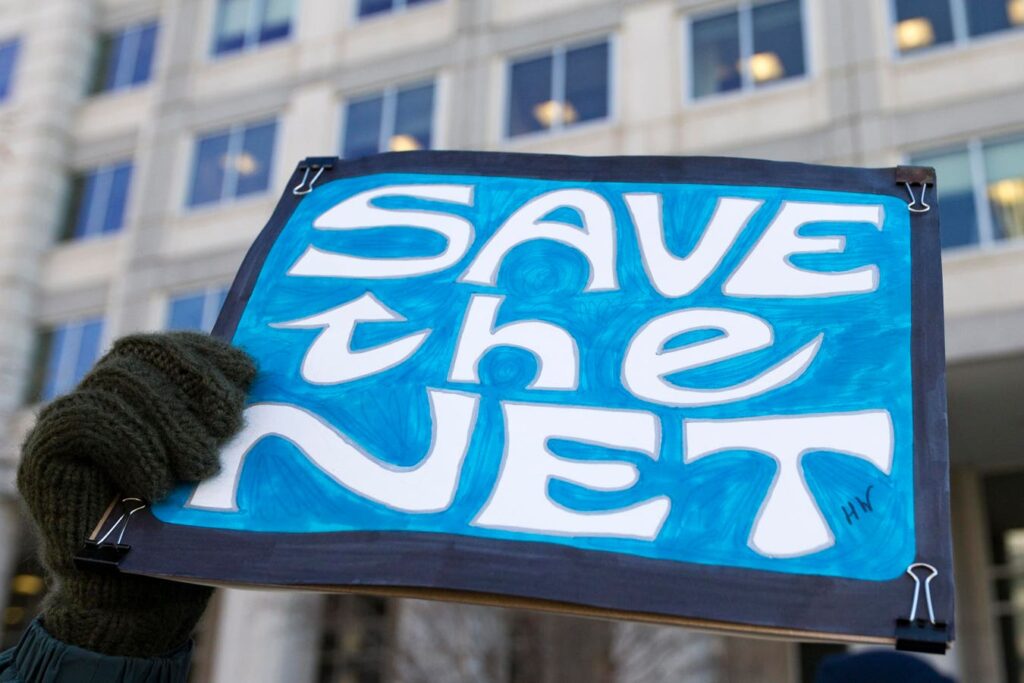(Photo credit should read ALEX EDELMAN/AFP via Getty Images)
A U.S. appeals court ruling has thrown out Biden Administration net neutrality rules, likely definitively killing long-sought efforts to control how broadband internet providers provide equal online access and, ultimately, even what what they might charge for that access.
In saying the Federal Communications Commission can’t reinstate its net neutrality rules, the U.S. 6th District Court of Appeals relied on a June Supreme Court decision that dramatically reduced the latitude and interpretative power of government regulators trying to implement federal laws.
It likely ends for good a two-decade fight to redefine, and thus regulate, the companies providing the high-speed “pipes” that consumers and businesses use to access internet connections. Beyond that, it ends a passionate policy fight whose roots reach back to the earliest, idealistic days of the publicly available internet, and what it might be as a shared “network of networks” as it became commercialized.
A see-saw process of regulations instated and killed off unfolded under succeeding presidential administrations of both parties, with the Biden-era FCC trying to reinstate the rules that would have classified broadband providers under Title II of federal laws that allow closer regulation of “telecommunications services” instead of “information services,” as broadband is currently defined.
But the Biden Administration efforts to reinstate the rules were killed off under the appellate court’s reading of the so-called Loper Bright decision last summer that threw out the so-called “Chevron deference” approach courts long used in interpreting whether administration regulations were proper in how they interpreted Congressional intent.
“Applying Loper Bright means we can end the FCC’s vacillations,” the appeals court decision reads. It later reads that with the now-ended “Chevron deference” provisions in court reviews of administrative regulations, ‘we no longer afford deference to the FCC’s reading of the statute. Instead, our task is to determine ‘the best reading of the statute’ in the first instance.”
Now, Loper Bright likely will be used in a string of lawsuits attacking additional FCC and other regulatory bodies on a variety of subjects. That said, critics of the law said its demise was long in coming.
The appellate court’s assertive language ending the net neutrality provisions “shouldn’t be a surprise,” said Craig Moffett, co-founder of research firms MoffettNathanson. “Indeed, the reason we and others stopped worrying about (FCC plans to reclassify broadband providers) was because it was clear that the judicial principle of ‘Chevron Deference’ wasn’t going to survive much longer.”
Moffett traced the toss-out to an unrelated, “obscure” opinion by Supreme Court Justice Clarence Thomas whose implications meant that at least since 2020, the agency’s back-and-forth on net neutrality was “doomed,” Moffett wrote in a short post.
“Still, this ends a long and torturous chapter for cable investors that dates back all the way to 2010, when then-Chairman of the FCC Julius Genachowski first floated the idea of Title II reclassification. We won’t be sorry to never have to write about this subject again.”
The decision perhaps is most important as one of the first notable applications of Loper Bright. It potentially has implications for not just broadband providers such as Verizon, AT&T and Comcast, but also for heavy generators of Internet traffic such as streaming-video companies. In turn, consumers could be affected, if broadband providers no longer bound by the threat of regulations decide to penalize or block some companies from using their networks.
Incoming FCC Chair Brendan Carr has long been a net neutrality opponent, his former aide Even Swartrauber quoted in the New York Times saying the opinion “puts to bed an issue that unnecessarily sucked up a lot of oxygen in tech and telecom for two decades now.”
Democrats and tech firms wanting to overcome the high barrier of the court’s decision will need to turn to Congress, and the unlikely prospects for renewed legislative efforts there.
Read the full article here
